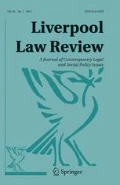Abstract
This article considers the historical development of certain aspects of poor relief in England and Wales and their connection with the treatment of vagrants. It will argue that it is the historical link between early statutes controlling both the movement of labourers and the destitute in the fourteenth century and the later parochial responsibility for the relief of poverty which led both to the inclusion of vagrancy provisions within the 1601 Poor Relief Act, and the continuing quasi-legal connection between vagrancy provisions and the relief of poverty. A nexus of punishment was created within the operation of the poor law by the two-fold role of justices of the peace; these officials not only adjudicated the settlement laws, but were also responsible for the legal control of vagrancy. The article will argue that this contributed to the harshness of the 1834 poor law reforms, and continues with contemporary approaches to the relief of poverty via Social Security legislation which prioritises the control of claimant fraud above the rights of the individual to relief from want.
Similar content being viewed by others
Author information
Authors and Affiliations
Rights and permissions
About this article
Cite this article
Charlesworth, L. Why is it a Crime to be Poor?. Liverpool Law Review 21, 149–167 (1999). https://doi.org/10.1023/A:1005686302457
Issue Date:
DOI: https://doi.org/10.1023/A:1005686302457




